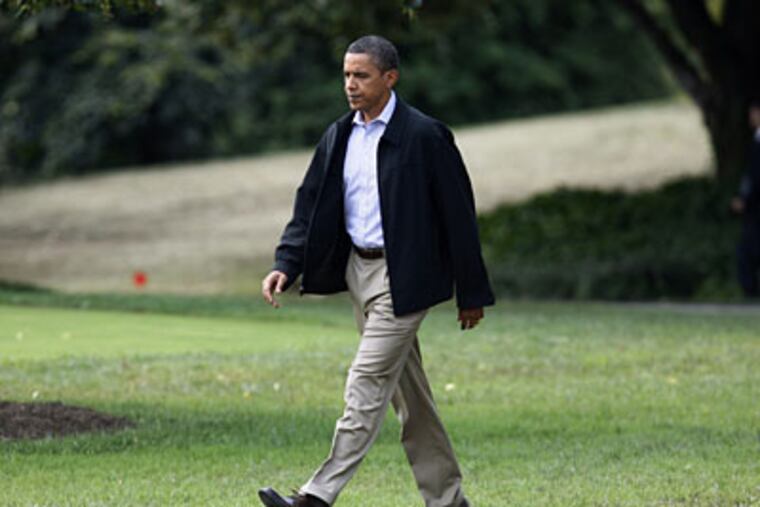Schools wrestle with Obama's live speech
There is no doubt that students at the Thurgood Marshall School in Philadelphia's Olney section will be watching President Obama's speech to the nation's children Tuesday.

There is no doubt that students at the Thurgood Marshall School in Philadelphia's Olney section will be watching President Obama's speech to the nation's children Tuesday.
With them will be Secretary of Health and Human Services Kathleen Sebelius, one of the cabinet members Obama is sending across the country to watch and discuss his message with pupils.
But despite urging from Govs. Corzine and Rendell, the Pennsylvania State Education Association, and the federal and Pennsylvania education secretaries, there seemed no rush among 15 school districts surveyed yesterday to broadcast the speech live in their classrooms.
Some children won't be watching the talk live because parents object to the president's possible political agenda in delivering the speech, and question the intent of a classroom activity that the federal government provides. Also, the speech comes at a bad time - noon, or lunch hour - at various schools.
Some districts have gone so far as to implement special policies for handling delicate topics. Others have encouraged teachers to gauge whether Obama's text dovetails with a future civics lesson.
"We are hearing from parents on both sides of the issue," said Todd Parker, curriculum supervisor for social studies in the Tredyffrin/Easttown School District.
"We will not broadcast the speech live in our schools, based on the timing of the speech, and we want to let teachers review the speech first to see if it fits into their curriculum."
The North Penn School District in Lansdale also chose not to show the talk live, saying it would not have enough time to give parents proper notice about the broadcast.
Still other districts will give parents a chance to preview the text online Monday. Most of those surveyed, however, are offering parents who object a chance for their children to skip the speech.
In the 4,122-student Unionville-Chadds Ford district, from 20 to 30 parents objected, so schools will allow parents to write an opt-out note to be carried to school by the pupil Tuesday.
"An alternative educational opportunity will be available for those students who opt out," said Rich Hug, the district's director of technology and communications.
At Elizabeth Haddon Elementary in the Haddonfield School District, principal Craig Ogelby also gave parents a chance to opt out.
Several districts objected to the speech because of timing. Many start classes Tuesday, and had orientation programs planned.
For others, the start time clashes with the flow of the school day. The speech is being shown live on the White House Web site and on C-SPAN.
"The timing for school districts on the East Coast could not have been worse," Hug said. "Many of our children will be eating lunch, and our middle school will be changing classes during the address."
Lower Merion schools spokesman Doug Young said that Tuesday, the first day of school, already had been filled with start-up activities.
"It's not an opportune time for our district to have a large-scale event, other than orientation that usually goes on, on the first day of school," he said.
Haddon Township Superintendent Mark Raivetz, who oversees about 2,300 students in seven schools, says he applauds the idea of the president's speech, but says Tuesday is the first day of school and it will be impossible to arrange a video feed at noon, when many classes are going to lunch.
Raivetz said he met with his principals and they decided to record the speech and to make it available to teachers to use in their classrooms as appropriate.
In Philadelphia public schools, though, principals were being asked to "make their best efforts" to have students watch the speech, spokesman Fernando Gallard said.
Tuesday is also Philadelphia students' first day, so the logistics might not work for some teachers, Gallard said, but principals were to let students know that the speech would be available online for watching, either at home or after the morning broadcast.
"We will point teachers to the right resources to make this available," Gallard said.
John Armato, the Pottstown School District's director of community relations, said choice was the crux of the district's response to the president's speech.
"Our teachers will make the determination as to whether it fits into their lessons," he said.
The president is expected to talk directly to the nation's schoolchildren about setting goals, taking responsibility for their own education, and the importance of staying in school.
Yesterday, the White House dismissed as pointless the furor over Obama's talk.
"I think we've reached a little bit of the silly season when the president of the United States can't tell kids in school to study hard and stay in school," spokesman Robert Gibbs said.
The Pennsylvania State Education Association, the state's largest teachers' union, pressed districts to broadcast the speech in classrooms.
"President Obama's planned speech to America's schoolchildren next week is an opportunity for students to participate in democracy. It should not be politicized by the president's opponents," the union said in a statement.
Critics of the speech, many of them conservative bloggers and radio pundits, said the speech and accompanying lesson plan were devised to promote the president's political agenda and exceeded the bounds of proper federal involvement in the schools.
The lesson plan initially included a suggestion that pupils write a letter to Obama saying how they could help him, but that was dropped yesterday. The item now suggests that pupils write a letter to themselves about how to reach their long- and short-term education goals.